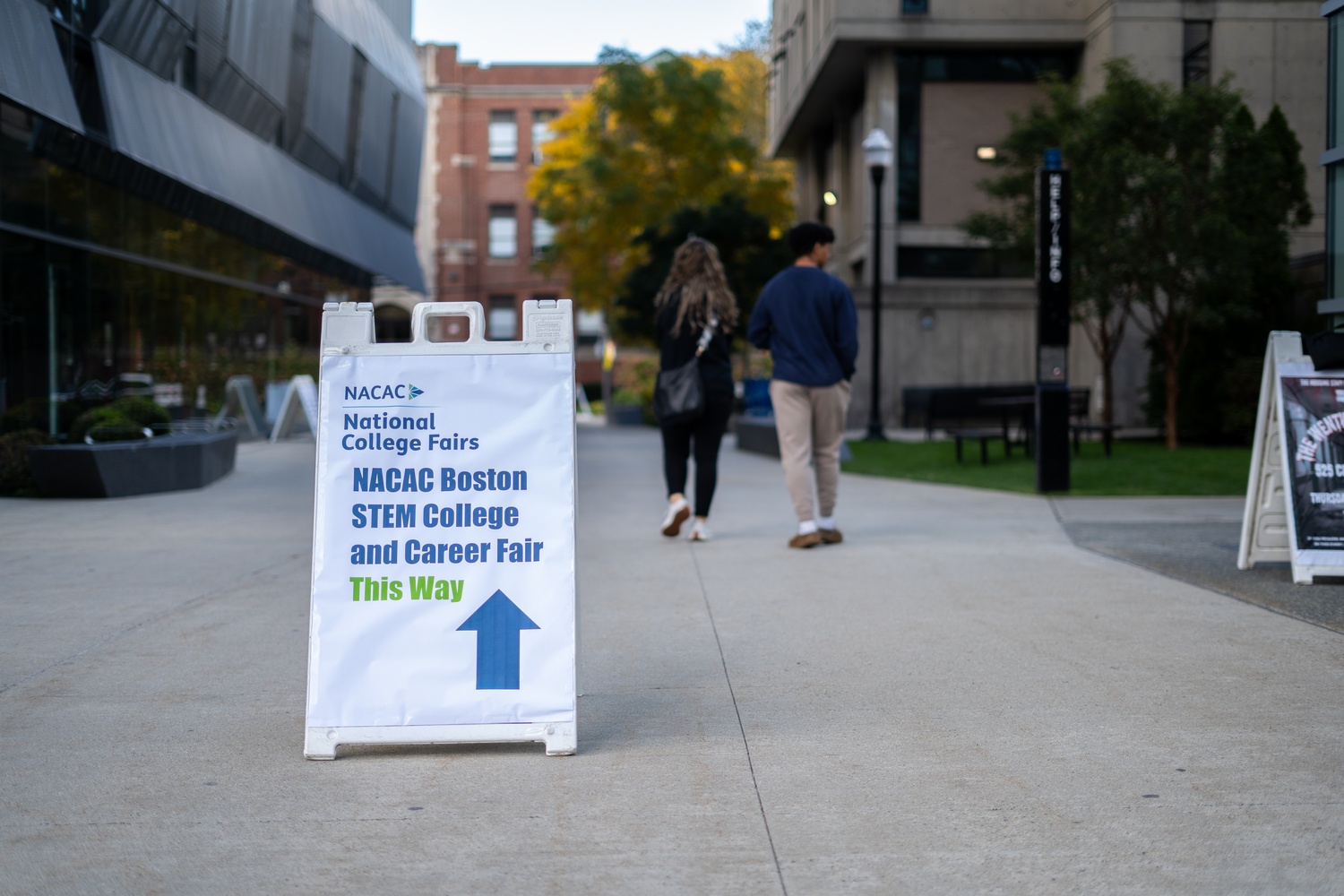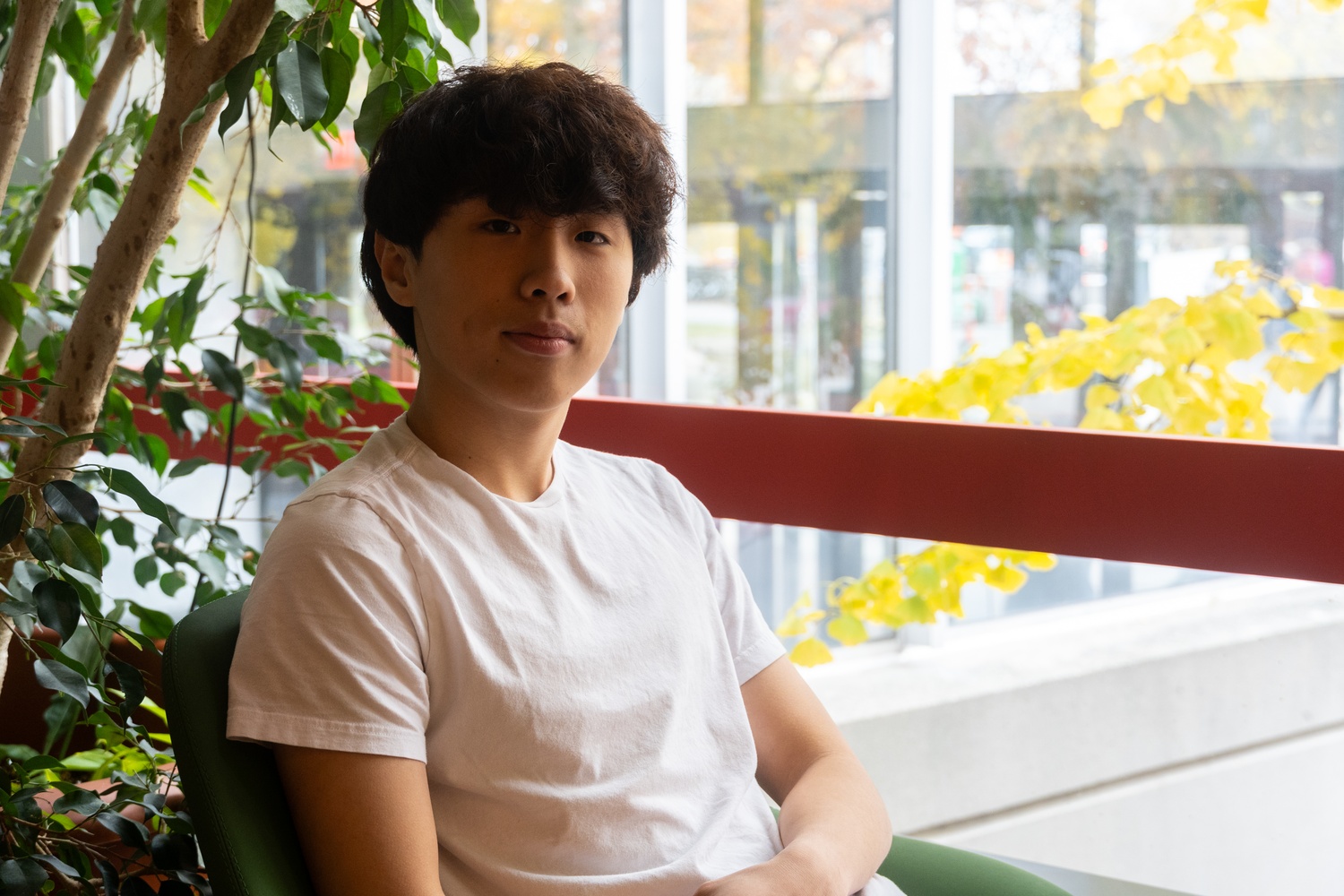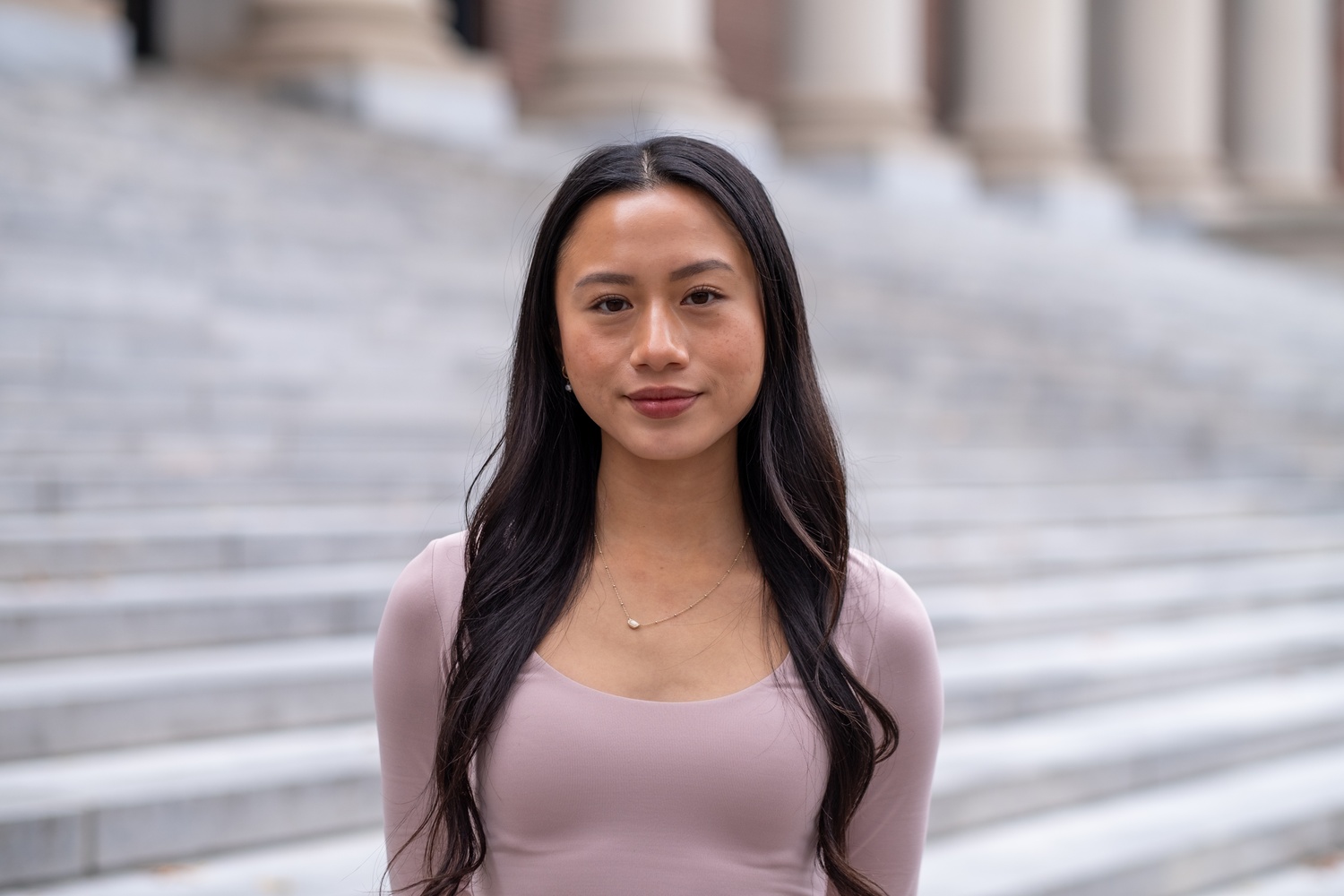
The Business of Getting In
By Hugo C. Chiasson and Nelli U. Rojas-Cessa, Crimson Staff WritersOn a Sunday afternoon in the middle of Boston, hundreds of proactive high schoolers flocked into the Tansey Gymnasium at the Wentworth Institute of Technology. They were there for one reason: They wanted to get into college.
A handful of independent college consultants followed suit, taking part in The National Association for College Admissions Counseling’s fair, walking alongside students between rows of folding tables set up bearing the names and insignias of dozens of universities.
As a slightly hidden part of the admissions process, private college consultants serve a small section of the overall college applicant pool, providing strategy and support to their clientele.
School representatives constantly straightened stacks of full-color pamphlets, die-cut stickers, and eggshell-white business cards. Hands knocked over the neat piles in hopes that the information contained within these handouts would be the key to their next four years.
As attendees filed out of the gym — plastic bags filled with literature in tow — students and consultants alike returned to the outside world, far from the admissions offices and the decision-makers within them.
In recent decades, college admissions have become an increasingly stressful and opaque process for students. Applicants are writing more and more essays, applying to more and more schools, and competing against more and more qualified candidates. Harvard’s own admissions rate has dropped to roughly four percent, more than half of what it was 20 years ago.
College admissions consultants guarantee their clients’ success. Websites promise students admission letters to some of the most exclusive institutions of higher education in the country.
However, the job is vaguely defined. Some consultants merely assist with writing essays and editing resumes. But others take on clients’ entire extracurricular lives, advising students on contests, in-school leadership positions, and summer internships. Students can start working with some of these consultants as early as kindergarten, preparing for the start of their college application journey before they’ve even finished reading a chapter book.
As admissions rates at highly selective colleges and universities continue to plummet, concerning parents and students alike, a guarantee of success is a valuable commodity. But it’s a specific definition of success that many firms are selling. They tie themselves in name and image to the most recognizable schools in the country, frequently alluding to the Ivy League. In particular, a number of firms directly allude to Harvard with names like Veritas Academic Consulting or Veritas College Counseling.
Even Harvard undergraduates have gotten in on the action, founding college counseling firms using their acceptances as proof of their services’ efficacy.
Despite the wealth of college counseling information in forums and online databases, the college consulting industry still remains lucrative. In 2023, estimates valued it at over $3 billion. But several consultants say that their goal isn’t profit but democratization. They offer free resources for students to access, making an opaque process more transparent and accessible to those who might otherwise be left out.
The exact impact of the for-profit college consulting industry on elite admissions is difficult to measure. But the industry still thrives, in part because it depends on an unsolvable quandary: what differentiates those who get in from those who do not.
‘The Name Game’
In his freshman year of high school, Eric sought out a college consultant. As his parents were both immigrants and were taking a mostly hands-off approach to his college search, he wanted to work with someone who knew the ins and outs of the admissions process at American colleges and could give him more individualized attention. He started working with Elite Educational Institute.
Last month, the California native submitted his Restrictive Early Action application to Stanford University. For Eric, EEI helped him navigate his high school years. He says the firm gave him a competitive edge with his college applications by identifying summer opportunities for him well before senior year. And other resources — namely, a personalized consultant who helped him write his essays and shape his applicant narrative — offered the support he otherwise lacked.
Consulting firms sell a product to students like Eric: insider knowledge. As a key marketing strategy, they draw on the insecurity of inexperienced families, many of them undergoing the college application process for the first time. Warnings of tricky essay prompts and common application mistakes litter company advertisements and social media posts.

College applications have several moving parts. Everything from the verbs used in the activities list to selecting an intended major can be an influential aspect of a submission. No student knows just what part of their application might make or break their chances.
Consultants step in to fill in the gaps, refine applications, and strategize with students before deadlines start to loom.
Aarav Mathur, a senior at Neuqua Valley High School in Naperville, Illinois, has been using the consulting service HelloCollege since the summer before his junior year. It was his parents’ idea — they hoped to provide their son with the best chances of getting into a prestigious university.
“I think I was a little bit more hesitant, because I felt like I could do it all on my own. I don’t think you need to waste eight to $10,000 on a college counseling service,” Mathur says.
His parents weren’t originally convinced to purchase HelloCollege’s services, given the price. A representative from the firm had offered the family a potential package, listing Ohio State and Urbana-Champaign as target schools. With those prices, Mathur says, “I should be shooting for the stars.”
Soon after hearing that Mathur’s parents were upset by the offer, Kevin Krebs, the founding and managing director, called the family directly to apologize and offer a personalized package.
Krebs’ sales pitch was aimed at Mathur’s parents — the ones who actually had to pay for college consultant services. This kind of targeted marketing is not abnormal within the larger industry. According to Tiffany J. Huang, assistant professor of sociology at The Ohio State University, small, local, independent college consultants can grow their business by word of mouth and referrals between parents.
But other firms — especially large-scale, online companies — directly market themselves to students and parents using social media and paid advertisements. Some offer in-person lectures at high schools as a way to draw in clientele.
At the same time as firms can heighten anxieties for applicants and their families, consulting firms publicize their successes and highlight their admissions rates for selective schools compared to the general figures. Some of the largest consulting firms, such as Crimson Education and Empowerly, claim to increase the likelihood of acceptance by three to 11 times, depending on the school.
Firms often draw on a perceived closeness to high-status institutions, according to admissions consultant Ashleigh Edwards. For students already coming from elite circles, attending a top-tier college is “more like a rubber stamp of your status,” Edwards says.
The Ivy Institute, IvyWise, Ivy Scholars, Ivy Strategy Advisor, and Ivy Coach are just a handful of firms that explicitly reference the Ivy League. Other firms decorate their websites with imagery or photographs that are easily identifiable with elite higher education institutions. The Great Dome at the Massachusetts Institute of Technology, Emerson Hall at Harvard, and other iconic landmarks decorating college campuses represent the exclusivity that students hope to gain access to.
For HelloCollege Chief Marketing Officer Andrea M. Emmons, these advertising strategies are a consequence of these elite schools’ public images. “It’s the name game,” Emmons says.
Several current Harvard freshmen — now secure in their dorms in the Yard — expressed skepticism about the efficacy and ethics of private college consultants. Of the more than 50 freshmen with whom we spoke most did not use private college consultants. Those who did use the services expressed a range of reactions, spanning the range of love and hate.
Several students shared that their high schools had cultures of secrecy surrounding college consultants. Choosing a college consultant wasn’t viewed as just utilizing a resource, but as unfairly gaming the system.
“To many people, ‘I have a college counselor’ sounded a lot like ‘Someone’s writing my essays for me,’” Michael Isayan ’29 wrote to us in an email.
Some students found the advice they received to be unimpressive and said that they could have found the same information online.
Others, like Wyatt J. Meyer ’29, wanted to maintain their authentic voice in their essays and believed that an outside consultant would hinder that goal.
“Ultimately, my mom gave me better feedback,” Meyer, who briefly worked with a consultant on his essays, says. “She just knew me better and knew what felt authentic to my application and my person.”
Regardless of whether students felt their experience was beneficial or not, there was a widespread concern about the industry’s recruitment and marketing practices.
“Navigating the college admissions process has never been more challenging,” the website for Admittedly, a large consulting firm, reads. “With acceptance rates plummeting and competition at an all-time high, families face one overwhelming question: How can my student stand out?”
Some Harvard students describe such marketing as predatory, using families’ fears about their child not getting into college as a means of soliciting students. James J. Obasiolu ’29, for example, says that the marketed admissions statistics are inflated by clients’ upbringings and socioeconomic status. Obasiolu originally worked with Zenith Prep Academy, a private firm, before he was selected as an Alexander Hamilton Scholar, a scholarship that provided him with free advising services.
“When these college consulting groups boast about their 92 percent acceptance rate to top colleges for students who participate in their programs, I’m wondering how much of that is actually their intervention versus the socio-economic advantages their clientele already possessed,” Obasiolu says.
For him, these companies’ successes lie in their presentation.
“These companies are essentially running a sophisticated marketing scam,” he says.
‘Might As Well Swing And Swing Big’
The admissions consulting firm Ivy Dream doesn’t put a cap on how much its clients pay. It gives them the option to keep buying in: On top of a $21,000 fee for an application overview of seven schools, students can tack on extra school reviews for $3,000 a piece.
Students, as consultant firms know, want to get in. And some families are willing to pay thousands of dollars to ensure they feel confident going into admissions season.
The industry hasn’t always been as ubiquitous as it is today. What began as a small part of the larger college application world exploded in the early 2000s with the rise of the Common App platform — and a consequential drop in admissions rates.
Today, consultants have incredible opportunities to make a profit. They invent new products and services, branding themselves as something necessary for students to succeed in the admissions game. Some consultant firms go as far as to offer college preparation for kindergarten students and social media management.
While exact figures vary substantially between different firms and individual consultants, costs have been reported to range anywhere from a few hundred dollars for essay editing sessions to over $100,000 per student.
Edwards worked with a handful of South Korean-based consulting firms that predominantly served wealthy students. “Most Korean firms have students outside of Korea: the big ones, the ones that charge $100,000 a year, which is the cost of the places I worked at. I’ve had students at Andover,” she says, referring to Phillips Academy, an elite private boarding school in Massachusetts. “I’ve had students — several students — at boarding schools, students in Singapore, students in Japan and China.”
Those rates are at the high end of the spectrum. Mathur shares that he and his family paid roughly $10,000 for his sessions with HelloCollege. Eric says his family has paid $13,000 since he began working with EEI.
Emmons says HelloCollege charges roughly $180 to $300 per hour — a step down from the roughly $300 to $600 typically invoiced by consulting firms — sold to families in set hourly packages.
“I would say most families are somewhere between 30-60 hours,” she says. “But some people — you’ll have people who go and have 200 hours.”
Other firms provide à la carte services ranging from $150 to $900, like The College Café, which breaks down its offerings by which part of the application they cover.
Some firms are more public about their payment plans — especially smaller companies. The Ivy Dream displays the cost of their various comprehensive packages on their website — including a thorough review of students’ social media accounts and internet presence to “ensure consistency with the crafted storyline.”
Other firms emphasize their offerings for students well in advance of their senior year. IvyWise markets advising for students as young as kindergarten, providing direct support for boarding school admissions and early college prep through its WiseStart program. The company advises parents that, in order to “maximize chances of success in the hyper-competitive college admissions process, families need to start preparing as early as possible.”
According to IvyWise spokesperson Megan Zuckerman, an initial consultation for WiseStart costs $2,125. Access to Roundtable, their signature college application review service intended to simulate real admissions committees, starts at $14,000.
“A comprehensive, multi-year college admissions counseling program is about $50,000, which is lower than at other consultancies that don’t employ former admissions officers,” Zuckerman wrote in an email. “The IvyWise Initial Consultation, a detailed service that includes an in-depth pre-screen of the student’s profile followed by a 90-minute meeting, starts at around $1,500.”

But even as more and more high-cost firms spring up, a growing ecosystem of free resources also flourishes online.
Ethan Sawyer, better known as the College Essay Guy, posts advice and tips on YouTube and other social media channels. In his videos, he sits in front of the camera, offering tips for writing more effective essays or preparing for interviews. Sawyer couches his advice in jokes, adopting a playful relationship with his audience. He also offers free resources and essay tips across his website.
Several students praise College Essay Guy’s free resources as being incredibly valuable in their own application processes. “There are fantastic resources, hundreds of YouTube videos. College Essay Guy has a really good, detailed website. It’s — to me — pretty rare,” Omar M. Hamarshi ’29 says.
(College Essay Guy also offers paid services, such as an online video course that starts at $594.)
For HelloCollege’s Emmons, free resources on social media are ultimately “bite-sized bits of education.” Her firm offers its own free resources, including a college application tracker and calendar. “We always like to say, 90 percent of people who interact with HelloCollege are getting something for free,” she says. “And 10 percent are coming on to be clients of ours.”
These types of free online resources are ubiquitous but impersonal. Often, students will turn to internet forums such as Reddit for case-by-case concerns, where entire communities are dedicated to answering admissions questions. One of the most well-known forums is r/ApplyingToCollege, a center for students, parents, and private consultants to share tips and success stories, while collectively bemoaning the difficulty of college admissions.
According to Mahpara Faatin ’29, platforms like Reddit serve as an especially valuable tool for international students, as they can ask specific questions about the U.S. college application process.
While A2C — as it is commonly known — can often be a place where anonymous users uplift each other, its lesser-known and more insidious counterpart r/ChanceMe can be discouraging. Students present their “stats” (GPA, class rank, SAT scores, extracurriculars) to be judged by their anonymous peers.
“Do I have a chance at Harvard?” wrote one aspiring junior eight months ago, pointing to a 4.7 GPA and a goal to raise SAT scores to 1550 in June.
Users wrote back: “Nothing stand out” and “average” and “shoot your shot then move on.”
One commenter added, “I mean, it’s Harvard, so you’re going against a lot of people who’ve been planning for this literally since preschool. But might as well swing and swing big because you never know if it’s your lucky day.”
Alongside informal support from peers and formal support from school guidance counselors, these internet resources offer insight into an otherwise opaque college admissions process — especially for those without the means or access to a private consultant.
But for those with the means, private consultants can still offer something more: individualized advising and structure for their clients. Many students find that the most helpful part of working with a consultant is the logistics.
“A lot of the function is this time management, organizational anxiety-reducing function that – having someone help keep you on task prevents that anxiety of having to submit all your applications at the last minute,” Huang, the assistant professor, says.
Eric and Mathur share that their early application process was mostly finalized by the end of September, a product of consistent work with their respective consultants.
Mathur also credits his college consultant with pushing him to achieve his personal best. Though he had scored an already above-average ACT superscore of 34, his college consultant urged him to retest, resulting in his final score of 35.
Even with abundant free resources, students find themselves in search of a formula for success — the right combination of stats, extracurriculars, and personal hooks that will guarantee them a spot on decision day.
‘It’s About The Next 40 Years’
Yangzhen Chen ’29 started his own admissions firm, Veritas Pathway, the same month he received his acceptance letter to Harvard. Having compiled resources for his own application process, Chen felt he was uniquely qualified to provide support to his peers, a role he wished someone had filled when he was applying.
Chen works with students as early as freshman year of high school — though he doesn’t recommend anyone solicit services earlier due to the anxiety that comes with the college application process. He primarily connects with them through word of mouth.
“I cold-called my first client, immediately got an offer. She was really satisfied with my service. And that’s when I realized that I could definitely do this with more clients. A lot of people ask me for help, and a lot of people are happy with it,” he says.

Chen now charges $290 per hour for one-on-one consulting services. But charging for his services raises questions of access for him, so he tries to offset his practices by supplying half of his students with pro bono support. Coming from a FGLI background, he says he recognizes the importance of having a supplemental stream of income. The work helps supplement his income so that he can focus on other ventures, including nonprofits he founded.
But Chen is not the only Harvard undergraduate offering college consulting services. A growing pool of Harvard-branded consultants must now strike a delicate balance between pursuing a successful business and democratizing access to college application materials. In an immensely lucrative industry where marketing already embraces tangential associations with the Ivy League, an inquiry email ending in “harvard.edu” is a built-in advertising tool.
Elise M. Pham ’26, the founder of the Ultimate Ivy League Guide, is one of the most visible Harvard-affiliated college consultants. Her content promises a “proven path” to elite college admissions to her more than 1.8 million followers across her social media accounts.
The Ultimate Ivy League Guide is projected to earn $500,000 to $700,000 per month in the upcoming months. Pham took a leave of absence in the fall semester of her junior year to expand her college consulting business.
But Pham says her initial goal with starting her college consulting business was to broaden access.
“I grew up in a single immigrant parent household. A lot of my audience and the students that watch my videos come from similar backgrounds as well, or they’re students that are really ambitious and looking to get into these top schools as a gateway to whatever they want to achieve,” Pham says.

Other firms also advertise themselves as positive or equalizing forces. Spark Admissions CEO and founder Rachel B. Rubin says the firm prioritizes their clientele’s happiness throughout the application process. Rubin’s philosophy when working with families is on cultivating students’ authentic interests and passions.
“We're able to take out all of the noise, take out the stress from the process, and help them identify and really focus on the things that they care about and the ways that they want to spend their time,” she says. “As a result, they're much happier.”
HelloCollege also advertises its clients’ success in scholarships, citing a $30,000 average decrease in college costs. The emphasis on scholarships appeared during Krebs’ sales pitch to Mathur and his parents. According to Mathur, “he blueprinted what my time with them would look like,” including scholarships that would help Mathur’s family save money.
But before Mathur and his family could save money on scholarships, they paid for the firm’s services. Emmons ultimately thinks that the investment in HelloCollege’s paid resources is worth it for students in the long run.
“It’s about the next 40 years, not about the next four years,” she says.
***
Huang’s research has focused on how working with a college consultant affects experiences of the admissions process. Her answer: there ultimately isn’t enough data to draw strong conclusions.
“It's very hard to say what would actually have been different if these students did not work with private college consultants,” she says.
Behind the closed doors of the admissions office, readers struggle to determine whether or not not applications were shaped by private consultants.
And students, parents, and private consultants continue to confront a rapidly changing college admissions world. Harvard itself keeps amending its admissions requirements, bouncing back and forth on requiring standardized tests in the wake of the Covid-19 pandemic.
Another shift came with the Students for Fair Admissions decision in 2023, which heralded the end of affirmative action and race-conscious admissions. The University updated its supplemental application essays and recently prohibited alumni interviewers from mentioning an applicant’s race in their report.
Outside of the Brattle Street admissions office, students are changing how they approach their applications. Students post on A2C with increasing frequency about concerns that their essays will get flagged for using artificial intelligence. Their fears are not unfounded — some schools have recently rescinded admission letters for students whose application information was found to be falsified.
Questions about external influences on applications and their authenticity will only get more complicated.
Even with these changes, a trend persists: college admissions are getting more competitive. Resources trying to offer applicants an edge continue to proliferate. Consultants sell convenience and a sense of assurance to their clients, a valuable commodity in an increasingly uncertain process. The cycle will continue, so long as there is demand.
For some students with institutional knowledge and support from high schools that typically send students to highly selective colleges, this sense of security isn’t necessary. For others, family members offer advice passed down during their own admissions process.
Still, a desire to succeed or a fear of missing some critical information can drive a student to solicit outside help. But that’s not everyone.
“Most people don't have a college consultant that they work with, and there are plenty of people who do it successfully,” Emmons says.
Maybe the answer to how to secure a spot at one’s college of choice is in the pamphlets passed out at WIT. Maybe it’s somewhere with a private college consultant. Maybe it’s out on the internet, waiting to be found. What makes one answer better than another isn’t always explicitly clear, but college consultants continue to sell clarity.
At the end of the day, the process is out of students’ hands. As of writing, Harvard and other colleges have not yet released admissions decisions to applicants.
What will put someone over the edge to gain them a spot in the class of 2030?
We can only guess.
—Staff writer Hugo C. Chiasson can be reached at hugo.chiasson@thecrimson.com. Follow him on X @HugoChiassonn.
—Staff writer Nelli U. Rojas-Cessa can be reached at nelli.rojas-cessa@thecrimson.com.
